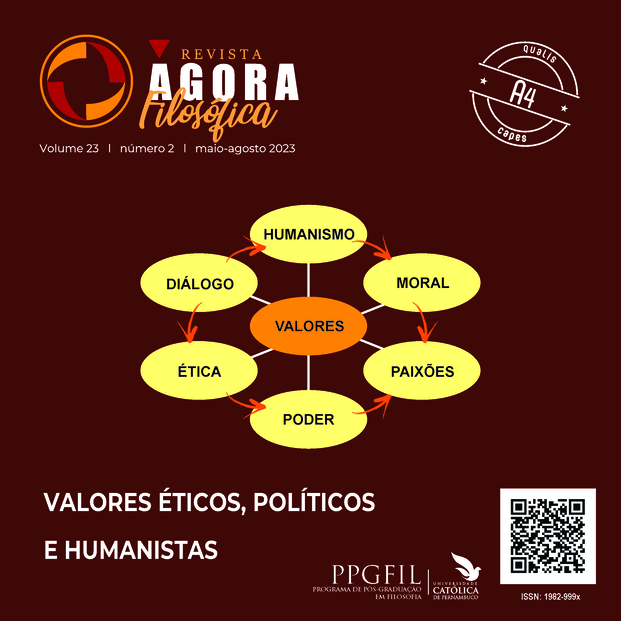Politics and human plurality in Hannah Arendt: an introduction to the theme of power
DOI:
https://doi.org/10.25247/P1982-999X.2023.v23n2.p144-160Keywords:
Action, Public place, Freedom, WorldAbstract
Politics, for Arendt, is linked to action and relationships between human beings, considering speech and discourse as something intrinsic to political action. In this sense, without political action, the subject tends to lose his individuality and his place in the world, as well as distancing himself from human plurality and the public space. Relating the 'individual - action - public space - subjectivity' dynamic, Arendt highlights an extremely important aspect: that of human plurality as related to the notions of equality and distinction. In this conceptual perspective, Arendt's understanding of power always calls into question human plurality and joint action, so that from this arise discourses that are not used to veil intentions, but to unveil realities, where words bring with them a movement of action reverberated with meaning. It is in this injunction that power arises, which, for Arendt, exists when men act together. We aim, therefore, in this text, to expose Arendt's arguments that support his concept of political power in relation to human action and plurality and how this also links us to the world.
Downloads
References
ARENDT, Hannah. Sobre a revolução. Tradução de Denise Bottman. São Paulo: Companhia das Letras, 2011.
ARENDT, Hannah. Origens do totalitarismo. Tradução de Roberto Raposo. - 1. ed. São Paulo: Companhia das Letras, 2012.
ARENDT, Hannah. Entre o passado e futuro. Tradução de Mauro W. Barbosa. São Paulo Perspectiva, 2016.
ARENDT, Hannah. A condição humana. Tradução de Roberto Raposo; revisão técnica e apresentação Adriano Correia. - 13. ed. rev. - [Reimp.] - Rio de Janeiro: Forense Universitária. 2020.
ARENDT, Hannah. Sobre a violência. Tradução de André Duarte. - [15. ed]. - Rio de Janeiro: Civilização Brasileira, 2022.
AGUIAR, Odílio Alves. “A dimensão constituinte do poder em Hannah Arendt”. Trans/form/ação: revista de filosofia / Faculdade de Filosofia, Ciências e Letras de Assis. Marília, v.34, n.1, p.115-130, 2011. Disponível em: https://www.scielo.br/j/trans/a/LswRct9X9J8hmjxHrnYFD5N/?lang=pt&format=pdf.
CORREIA, Adriano. “Quem é o animal laborans de Hannah Arendt?” Revista de Filosofia Aurora. Curitiba, v. 25, n. 37, p. 199-222, jul./dez. 2013.
CORREIA, Adriano. Hannah Arendt e a modernidade: política, economia e a disputa por uma fronteira / Adriano Correia. 1. ed. Rio de Janeiro: Forense Universitária, 2014.
DIAS, Lucas Barreto. “Totalitarismo e mundo de semblâncias a partir de Hannah Arendt”. Cadernos Arendt, v. 02, N. 03, 2021a.
DIAS, Lucas Barreto. “O aparecer da liberdade no pensamento de Hannah Arendt”. Perspectivas, 6(2), 228–244, 2021b. https://doi.org/10.20873/rpv6n2-13
RIBEIRO, Nadia Junqueira. A distinção entre o social e o político em Hannah Arendt à luz da questão judaica. Tese (Doutorado em Filosofia) – Unicamp. Campinas, 2022.
SILVA, Ricardo George de Araújo. A questão judaica: o pária como paradigma do agir e do pensar em Hannah Arendt. Taboão da Serra: Vicenza Edições Acadêmicas, 2020.
Downloads
Published
Issue
Section
License
Copyright (c) 2023 Lucas Barreto Dias, Débora dos Santos Góis Gondim

This work is licensed under a Creative Commons Attribution 4.0 International License.
You are free to:
- Share — copy and redistribute the material in any medium or format for any purpose, even commercially.
- Adapt — remix, transform, and build upon the material for any purpose, even commercially.
- The licensor cannot revoke these freedoms as long as you follow the license terms.
Under the following terms:
- Attribution — You must give appropriate credit , provide a link to the license, and indicate if changes were made . You may do so in any reasonable manner, but not in any way that suggests the licensor endorses you or your use.
- No additional restrictions — You may not apply legal terms or technological measures that legally restrict others from doing anything the license permits.
Notices:
You do not have to comply with the license for elements of the material in the public domain or where your use is permitted by an applicable exception or limitation .
No warranties are given. The license may not give you all of the permissions necessary for your intended use. For example, other rights such as publicity, privacy, or moral rights may limit how you use the material.
















